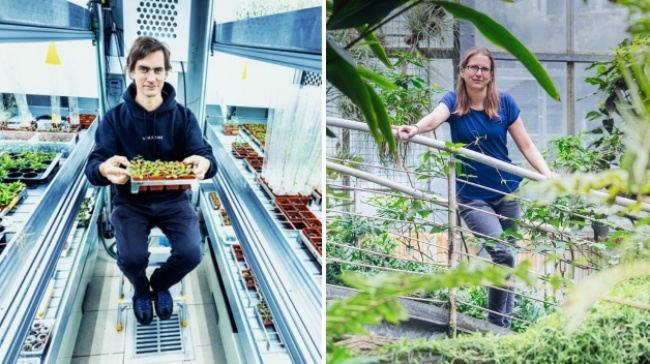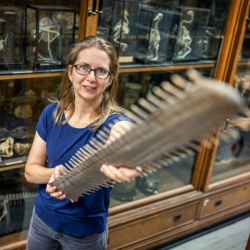Two biologists, Dr. Zuzana Musilová and Dr. Matyáš Fendrych (both from the Faculty of Science of Charles University), have been awarded Consolidator grants from the European Research Council (ERC). With the significant financial support they receive from the research grants, they can now consolidate research teams and further research in their fields.

Photo: Petr Jan Juračka, Faculty of Science, Charles University
"The award of two ERC Consolidator Grants to Dr Fendrych and Dr Musil shows how important it is to learn about the most basic building blocks that make up life on earth. At a time when we are experiencing first-hand the fragility of our ecosystems, knowledge in the field of natural sciences is crucial not only for understanding the future of our planet, but can also positively influence the fate of the human population," said Milena Králíčková, Rector of Charles University.

Photo: Petr Jan JuračkaA European Research Council grant has been awarded to Zuzana Musilova's research on deep-sea fish, known for their extraordinary adaptations, including their enhanced sensory systems. Fascinatingly, some deep-sea fish have evolved unique vision that possibly allows them to see colours. "I will study the functional evolution of this visual system and will explore the limits of vertebrate eyes in extreme conditions. Namely, I will focus on the fundamental question of whether deep-sea fish can see in colour. To perceive light, the vertebrate retina has two types of photoreceptors, rods for dim-light vision and cones for daylight colour vision. Many deep-sea fish lack cones, making them colour blind. A novel visual system based purely on multiple different rod opsins may overcome this limitation and may either serve to perceive colours, or to make “superpowerful” rod cells sensitive to any colour of light. Either way, such visual system is not found in any other vertebrate species," said zoologist Zuzana Musilova, who has long been studying the genome of deep-sea fish and their evolutionary adaptability to living not only in the extreme environment of the deep, but also in the two different environments they encounter during their lives due to their biology. More in the Forum magazine interview, which you can read here.

Photo: Petr Jan JuračkaPlant biologist Matyáš Fendrych from the Faculty of Science is researching a phenomenon of plant biology - auxin. "Auxin plays an absolutely central role in the regulation of plant growth. Without it, there would be no plants as we know them today," says the biologist, who has recently succeeded in elucidating the so-called rapid auxin response in the root of the model plant Arabidopsis thaliana. This serves, among other things, to enable the plant's roots to quickly penetrate the soil and orient themselves well. "Now we want to find out whether this response is a 'specialty' that has evolved in the roots of Arabidopsis or whether it is a more general process that also takes place in other parts of the plant and in other species, such as grasses," says Matyáš Fendrych, whose further research will be made possible thanks to the prestigious Consolidator grant (ERC). More in the Forum magazine interview, which you can read here.